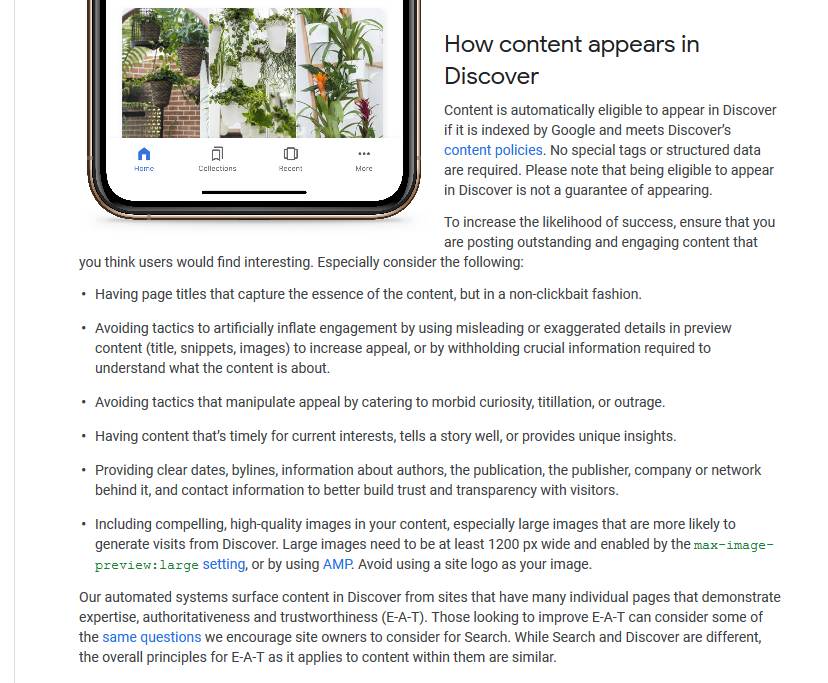Google hat das Help-Dokument für Google Discover aktualisiert. Es wurde fast vollständig überarbeitet. Interessante Neuerung: ein Abschnitt zum Thema „E-A-T“ („expertise“, „authoritativeness“ und „trustworthiness“) wurde ergänzt. Das Core-Update hatte somit auch einen großen Einfluss auf Google Discover. Publisher sollten ihren Fokus verstärkt auf Fachwissen, Ansehen bzw. Autorität und Glaubwürdigkeit legen.
Folgender Screenshot stellt einen Ausschnitt des neuen Help-Dokuments von Google Discover dar:

Im untersten Abschnitt wird ein Hinweis gegeben, wie Webmaster die eigene E-A-T verbessern können. Scheinbar kann man sich hier an denselben Fragestellungen orientieren, wie auch bei der Google Search Optimierung. Google Discover und Google Search seien zwar unterschiedliche Anwendungen, die Prinzipien der Expertise, Ansehen und Glaubwürdigkeit würden aber für publizierten Content in beiden Google Systeme gelten.
By the way: Google misst E-A-T bei der Suche zwar nicht ausdrücklich, andere Signale stehen aber in engen Zusammenhang mit diesen Parametern.
Interessant für SEOs: aktuell besteht die Problematik, dass EAT eher schwer quantifizierbar ist. Seiten, die aber in Google-Discover ausgespielt werden bekommen nun zumindest einen Anhaltspunkt dazu, ob sie in den Augen des Google-Algorithmus vertrauenswürdig sind.
Our automated systems surface content in Discover from sites that have many individual pages that demonstrate expertise, authoritativeness and trustworthiness (E-A-T). Those looking to improve E-A-T can consider some of the same questions we encourage site owners to consider for Search. While Search and Discover are different, the overall principles for E-A-T as it applies to content within them are similar.
Quelle: https://support.google.com/webmasters/answer/9046777?hl=en
So werden Webseiten in Google-Discover besser ausgespielt
Webseitenbetreiber, die Ihre URLs gerne in Google-Discover sehen möchten, können und sollen sich an folgende von Google vorgschlagene Tipps halten:
To increase the likelihood of success, ensure that you are posting outstanding and engaging content that you think users would find interesting. Especially consider the following:
- Having page titles that capture the essence of the content, but in a non-clickbait fashion.
- Avoiding tactics to artificially inflate engagement by using misleading or exaggerated details in preview content (title, snippets, images) to increase appeal, or by withholding crucial information required to understand what the content is about.
- Avoiding tactics that manipulate appeal by catering to morbid curiosity, titillation, or outrage.
- Having content that’s timely for current interests, tells a story well, or provides unique insights.
- Providing clear dates, bylines, information about authors, the publication, the publisher, company or network behind it, and contact information to better build trust and transparency with visitors.
- Including compelling, high-quality images in your content, especially large images that are more likely to generate visits from Discover. Large images need to be at least 1200 px wide and enabled by the
max-image-preview:largesetting, or by using AMP. Avoid using a site logo as your image.





